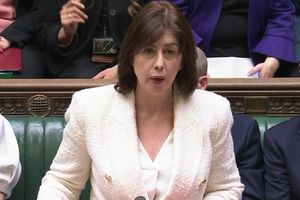Cutting the annual allowance for cash ISAs could backfire in multiple ways, an influential group of MPs has warned the government.
For months, speculation has been growing that the chancellor may slash the yearly limit for tax-free savings - potentially from £20,000 to £10,000.
The government is hoping to encourage savers to invest in stocks and shares ISAs instead, which can offer greater long-term returns and improve financial health.
But according to the Treasury Committee, slashing allowances would be unlikely to achieve this - and could lead to higher prices for consumers.
Building societies rely on cash ISA savings to fund mortgage lending - and a drop in deposits might lead to higher interest rates or fewer products on the market.
Committee chairwoman Dame Meg Hillier said "we are a long way" from achieving a culture where substantial numbers of Britons invest in the stock market.
"This is not the right time to cut the cash ISA limit," she warned. "Instead, the Treasury should focus on ensuring that people are equipped with the necessary information and confidence to make informed investment decisions.
"Without this, I fear the chancellor's attempts to transform the UK's investment culture simply will not deliver the change she seeks, instead hitting savers and borrowers."
Read more: How to get started with a stocks and shares ISA
The latest figures suggest two-thirds of contributions to ISAs in the 2023/24 tax year went to cash accounts - bringing total holdings to £360bn.
An estimated 14.4 million consumers solely save in a cash ISA, with the average balance standing at £6,993.
Surveys suggest that, if allowances were cut, consumers may move their cash to alternative savings accounts where they would have to pay tax on interest.
Skipton Group executive Charlotte Harrison previously warned: "Building societies, which funds over a third of all first-time buyer mortgages, rely on retail deposits like cash ISAs to fund their lending.
"If ISA inflows fall, the cost of funding is likely to rise, and that means mortgages could become both more expensive and harder to access."
She claimed a policy change could end up "penalising savers who want low-risk, flexible options" - adding: "Cash ISAs work. Undermining them doesn't."
Read more money news:
What's behind surprising rise in retail sales
Tesco rolls out bodycams to security staff
Chancellor Rachel Reeves said: "At the moment, often returns on savings and returns on pensions are lower than in comparable countries around the world.
"I do want to make sure that when people put something aside for the future, they get good returns on those savings."
The committee's warning comes amid speculation over whether Ms Reeves will raise income tax at next month's budget - breaking a key Labour manifesto pledge.
Newspaper reports have suggested that the basic rate of income tax could be increased for the first time since the 1970s - up 1p to 21%.
This could raise about £8bn and help tackle a black hole in the country's finances, but risks squeezing consumers further as a cost-of-living crisis continues.
A 1p rise to the higher band of income tax - taking that rate to 41% - is also believed to be under consideration, but this would only boost the nation's coffers by £2bn.
Ms Reeves has refused to rule out such a move, telling Sky's deputy political editor Sam Coates that she is looking at both tax rises and spending cuts ahead of her statement to the Commons on 26 November.

(c) Sky News 2025: Cutting cash ISA allowance could backfire - and make mortgages more expensive, MPs warn


 Labour's Lucy Powell will take a 'submarine approach' as deputy PM - for now
Labour's Lucy Powell will take a 'submarine approach' as deputy PM - for now
 Who is Labour's new deputy leader Lucy Powell and what does she stand for?
Who is Labour's new deputy leader Lucy Powell and what does she stand for?
 Twenty warnings for Sir Keir Starmer from new deputy leader Lucy Powell
Twenty warnings for Sir Keir Starmer from new deputy leader Lucy Powell
 China 'enemy' reference removed from key witness statement for collapsed spy trial
China 'enemy' reference removed from key witness statement for collapsed spy trial

